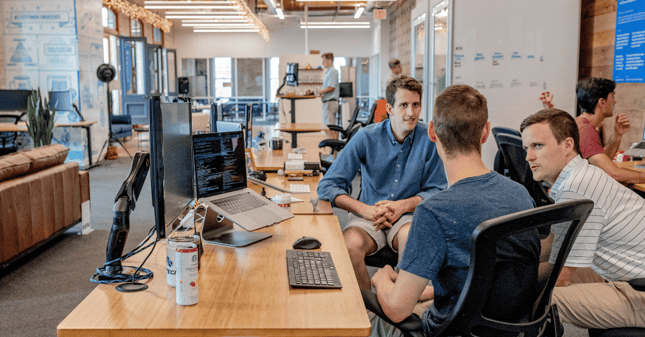Mental illness and depression in particular has turned into one of the leading causes of disability worldwide and according to the World Health Organization, costs the global economy about $1 trillion a year in lost productivity. We’ve built a solid norm around leaving the personal behind when stepping into our professional roles. And more often than not, mental health has been looked at as an inappropriate topic to bring to the table at the office. But as new generations are more comfortable talking openly about their mental health, it is slowly becoming a prioritized topic on the agenda at the workplace.
We’re entering a new era where companies are expected to care. Something that came to the forefront when the pandemic hit and companies had to manage change that didn’t only shake up the way we used to work, but our entire lives. How can companies take action in order to create a more humanized workplace? Let us walk you through 3 important steps you can take today to end the stigma around mental health at work.

1. Dare to take drastic action even if no one else is
Even if no one in your industry has ever brought this topic to the table. Be the pioneer in your field that sets the tone for how we should navigate mental health at the workplace moving forward! One company to look up to is Mindler who started the campaign #ownthegap to reduce stigma around mental health, and in particular - the gap we all have in our resumes but have been taught to cover up.
It’s important to look inwards to make sure that the values and culture we’re promoting is aligned with the daily actions we take. An example that showcases how to do so is Nike who gave their employees a week off to support their employees' mental health. Even if offering mental health days is a short-term solution to a potentially bigger issue. It’s still something that creates, not only value for your employees, but it also clearly vocalices what kind of environment you want to create - a safe enough climate for employees to put their mental health first and not feeling guilty about taking days off due to personal matters.
2. Act preventatively rather than reactively
It’s one thing to talk about a stigmatized topic but another to actually live and breathe it. To prevent rather than react, we need to take a more comprehensive approach where companies are fully investing in mental health support for their employees. But in order to take preventative measures, we have to look at one factor that plays a massive role: the company culture.
Gaining clarity by pushing out surveys will give you a good head start, but the most powerful action of them all is for you to model the transparent climate you wish to see. It’s not only a powerful statement but a way to encourage employees to feel safe enough to do it themselves. To show that you don’t only value your employees when they're productive, but in all aspects of their professional being. The more we normalise these conversations, the more liberated employees will feel when stepping into their work role as their full selves, even if it's not always their “best” self.
Dodging this will only create a bigger problem in the long run, because let’s face it - even if we’re not talking about it openly, it doesn't mean it’s not there. And if employees feel like they can’t be themselves at work, they will look for an employee where they can.
3. The undeniable connection between mental health and inclusion
Breaking the stigma around mental health means having a 360 perspective and aligning our D&I initiatives with our efforts to reduce the stigma around mental health. One is simply not enough without the other. How do we make sure that our resources are inclusive and available in all areas and accessible for everyone? It's a moral imperative to educate both employees as well as managers on intersectionality and how to build an inclusive workplace. Fostering true human connection means that we have to have uncomfortable conversations and make sure that employees are held accountable for inappropriate behaviour and create allyship to fight systemic inequality at the workplace.




